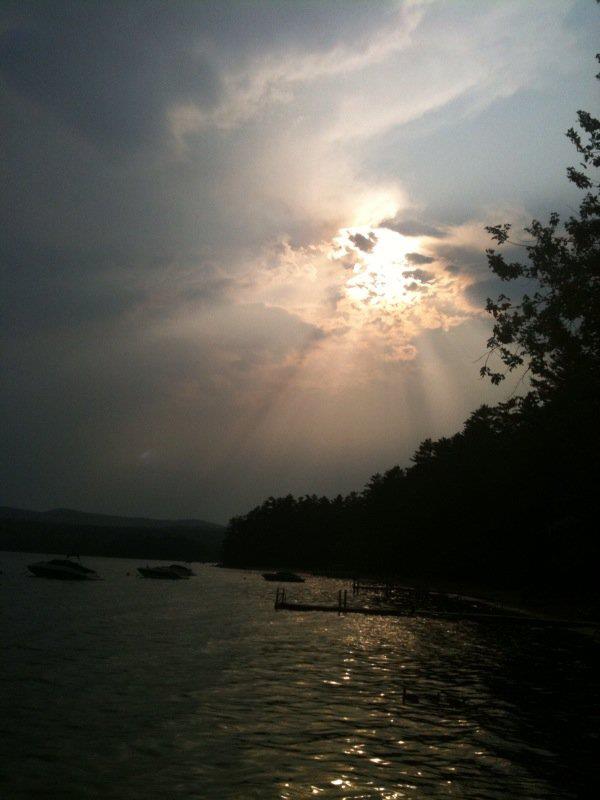Last year during Advent, I wrote a blog post called “Green Volunteers." I talked about a fuchsia plant that I had purchased for Mother’s Day 2020, which had faded during the summer (in part due to neglect), but then—remarkably—bloomed again around Thanksgiving. I brought it inside to try and carry it through the winter, but the transition to inside didn’t go well. I carefully watered it and placed it in a sunny spot hoping it might recover yet again. It did…
 |
| December 13, 2020 A "green volunteer" emerges. |
The picture below was taken August 10, 2021. That’s the same plant that was a “green volunteer” eight months ago. I moved it back outside this spring and it has thrived. Seeing it thrive makes me smile.
 |
| August 10, 2021 A "new thing" springs forth. What was barren now blooms. |
In my Advent devotional I wrote: [A famous line from the movie “Jurassic Park” was]: “Life finds a way.” (In the movie, the dinosaurs found a way to reproduce despite the scientist’s assurance that this was in fact “impossible.”) Nature bears witness to this. Think about areas ravaged by volcanic eruptions or forest fires. Life comes back in abundance afterwards. In fact, the ash can provide nutrients for new life. Eventually, life wins.
Over the past 17 months, we have been in the grips of a global pandemic, and other simultaneous societal upheavals. I have also experienced personal challenges I’ve had to overcome; I’m sure you have too. We’ve all had to “find a way” to, as Paul says, “keep running the race marked out for us.” Some days, that has seemed nearly impossible to do. There just seemed to be too much to take in, too much to overcome. And yet somehow here we are.
In March 2020, the world changed without much warning, and we had no choice but to “find a way” to adapt. In our church, I think we faced a collective crisis large enough that we actually overcame the inertia of “how we’ve always done it before.” (Some churches have been more successful at doing this than others.)
Not just in the Church, but across our society, we’ve had to learn new ways to be in community together. While some of us knew about Zoom before COVID, it really wasn’t the norm to use it. There was a learning curve we had to climb; it wasn’t always the easiest ascent, but we did it. Now, virtual meetings are commonplace. People of all ages conduct activities online. While live activities are slowly resuming (the Delta variant notwithstanding) hybrid is clearly the way of the future. Providing online options for participation in live events is no longer optional.
Following the plant analogy, in March 2020 COVID-19 stripped us down to bare minimum. We had to rapidly transplant ourselves to survive. We weren’t sure if the tender shoots would prosper in the new environment. We could plant, and we could water, but it was up to God to make things grow. And that's exactly what God did!
Like the fuchsia on my deck, 17 months later, flowers are blooming. COVID-19 is slow to loosen its grip, but where I worship, we are finding our way to a “new normal.” (I suspect the same is true at many other churches.) At my church, we have fellowship groups and Bible studies meeting online throughout the week via Zoom, as well as all of our committee meetings. While we surely lose some things by not being together face-to-face, we also gain things conducting certain church activities online. For example, we’ve gotten used to doing church committee business from the convenience of our homes.
The core elements of who we were before March 2020 may not have changed—but the world around us has. Make no mistake, we are emerging into a new day. There is no map to where we are headed; we almost "make the road" as we walk it. We must trust God to be our guide. “New things” are indeed trying to “spring forth.” and our job is to “perceive them” and embrace them—not resist them. If the Church is to thrive in the years ahead then we must find ways to meet the world where it is today. It becomes increasingly clear that they are not likely to come to us without a personal invitation.
FOR REFLECTION
· What new things do you perceive springing forth in your life today? At your church?
· What new things do you perceive as needed, that might be “trying to be born”? How can you be part of the birthing process?
· Where might we need to take a second look for “green volunteers”?
· What things can our churches do to help equip us to engage the “new world” around us?


